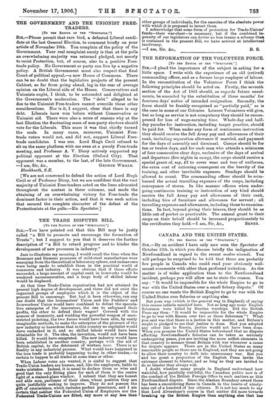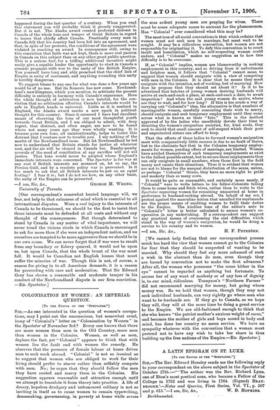CANADA AND THE UNITED STATES.
[To THE EDITOR OP THE " SPECTATOR.".1 SIR,—By an accident I have only now seen the Spectator of October 13th, in which you discuss briefly the indignation of Newfoundland in regard to the recent modus vivendi. You will perhaps be surprised to be told that there are probably few people in Canada who could read your obviously well- meant comments -with other than profound irritation. As the matter is of wider application than to the Newfoundland incident, perhaps you will allow me to state the reason. You say : " It would be impossible for the whole Empire to go to war with the United States over a small fishery dispute." Of course no one wants the British. Empire to go to war with the
United States over fisheries or anything else.
But your way (which is the general way in England) of saying this causes infinite mischief here. Not so long ago some English fishermen were killed by Russian warships. Did the British Press say then : "It would be impossible for the whole Empire to go to war with Russia over two or three fishermen "P What you said was that there is a justice in this matter, and Britain's might is pledged to see that justice is done. Had you adopted any other line to Russia, justice would not have been done. When you promise the United States beforehand that no dispute affecting Newfoundland's fisheries can be taken as seriously endangering peace, you are inviting the more selfish elements in that country to menace Great Britain with war whenever a cause for dispute appears. There are in the United States as many reasonable people as there are in England, and they are not going to allow their country to drift into unnecessary war. But you and too great a proportion of the English Press invite the extremer element to bluster, and as long as they are invited to do so bluster they always will.
I doubt whether many people in England understand how watchful, how painfully watchful, the Canadian public now is of the conduct of the British Foreign Office in such matters as this Newfoundland dispute. Since the Alaskan Boundary award there has been a smouldering flame in Canada in the hearts of ninety- nine out of a hundred of her citizens. It is not too much to say that Lord Alverstone's course in that matter did more towards breaking up the British Empire than anything else that has
happened during the last quarter of a century. When you read this statement you will probably think it grossly exaggerated. But it is not. The Alaska award created profound distrust in Canada of the whole tone and temper of Great Britain in regard to issues that chiefly affect Canada. Practically every man in Canada felt that his country had been led into an agreement, and that, in spite of her protests, the conditions of the agreement were violated in reaching an award. In consequence still, owing to this conviction that faith was not kept, there is more real passion in Canada on this subject than on any other great public question. This is a serious fact, for a trifling additional incentive might easily give a capable leader the opportunity to start in Canada a crusade pregnant with woe to the unity of the British Empire. You yourself have long and ably preached that the chief link of Empire is unity of sentiment, and anything wounding this unity is terribly dangerous.
To suggest blame to any one for what was done a few years ago would be of no use. But its Nemesis has now come. Newfound- land's unwillingness, which you mention, to arbitrate the present difficulty is entirely in harmony with Canada's experience. Here the whole thought of arbitration is now hateful, for the con- viction that no arbitration affecting Canada's interests would be safe in English hands is universal. Little as it is realised in England, . the Alaska award marks a new epoch in political thought for this country. Since it occurred I have had excellent means of observing the tone of our most thoughtful youth towards Great Britain, and I am obliged to admit, with deep regret, that distrust, and often anger, are now to be found where not many years ago they were wholly wanting. It is because your own tone, all unintentionally, helps to foster this distrust that I venture now to trouble you. I say nothing of the merits of the Newfoundland issue. But let Newfoundland be led now to understand that Britain stands for justice at whatever cost, and the air will be cleared in Canada too. Namby-pamby avowals of the need of conciliation at any sacrifice will not aid justice. That tone would never be adopted where England's immediate interests were concerned. The Spectator is for war at any cost if British interests are menaced on, let us say, the Persian Gulf, and by a resolute policy war is prevented. Is it too much to ask that all British interests be put on an equal footing? I fear it is ; but I do not see how, on any other basis, the unity of the Empire can be preserved.
University of Toronto.
[Our correspondent's somewhat heated language will, we fear, not help to that calmness of mind which is essential to all international disputes. Were a real injury to the interests of Canada to be threatened, we should be the first to insist that those interests must be defended at all costs and without any thought of the consequences. But though determined to stand by Canada in any matter of vital importance, we will never tread the vicious circle in which Canada is encouraged to ask for more than if she were an independent nation, and we ourselves are tempted to be more aggressive than we should be in our own cause. We can never forget that if war were to result from any boundary or fishery quarrel, it would not be upon us, but upon Canada, that the whole brunt of the war must fall. It would be Canadian not English homes • that must suffer the miseries of war. Though this is not, of course, a reason for giving in to all American demands, it is a reason for proceeding with care and moderation. That Sir Edward Grey has shown a reasonable and moderate temper in his conduct of the Newfoundland dispute is our firm conviction. —ED. Spectator.]



























































 Previous page
Previous page